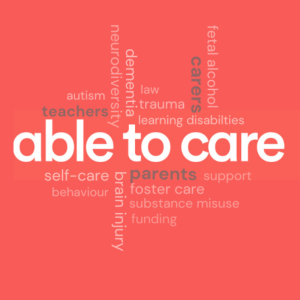
Friday Nov 15, 2024
How to Calm Challenging Behaviours: A Guide for Caregivers and Educators
Join host Andy Baker on the Able to Care podcast as he shares powerful strategies for de-escalating challenging behaviours through the HELP-Prompt-Wait-Protect approach. Andy explains each step of this practical model, offering insights on how caregivers, educators, and social workers can communicate calmly, validate emotions, and foster safer interactions. He highlights the importance of framing intentions, staying calm, and prompting positive actions to support individuals experiencing emotional distress.
This episode is a must-listen for anyone looking to improve their skills in managing difficult behaviours in care environments, classrooms, or at home. 🎧
Resources Mentioned:
- Carer’s Card UK (Sponsor): Gain access to discounts, a wellbeing hub, and support tools with Carer’s Card UK, designed to reward and recognise carers across the UK.
- Andy’s Book, "Targeting the Positive with Behaviours that Challenge": A guide to understanding behaviour, building connections, and effective de-escalation techniques for caregivers and educators.
Key Messages:
The HELP-Prompt-Wait-Protect Model for De-escalation
Andy introduces the HELP-Prompt-Wait-Protect model, a structured approach to addressing escalating situations by prioritising understanding, calm communication, and positive reinforcement.
Framing Intentions and Offering Support
One of the first steps in any de-escalation scenario is setting clear, supportive intentions. By stating, “I’m here to help, not to judge,” caregivers can create a safe space that diffuses potential defensiveness.
Effective Prompts for Positive Action
Andy stresses prompting desired behaviours, such as “Keep your hands to yourself,” rather than focusing on what not to do. This positive reinforcement encourages constructive behaviour.
Key Timestamps:
- 00:00:00 - Introduction to the Carer’s Card UK and benefits for carers
- 00:01:24 - Welcome to this episode and introduction to the HELP-Prompt-Wait-Protect model
- 00:01:49 - Defining de-escalation and the importance of positive reinforcement
- 00:03:47 - Framing intentions and creating a safe space in challenging situations
- 00:05:18 - The "HELP" acronym explained for assessing needs and sources of distress
- 00:05:58 - Prompting positive behaviours and avoiding “don’t” language
- 00:09:00 - The "Wait" stage: allowing space for self-regulation while remaining calm
- 00:10:19 - The "Protect" stage: Dynamic risk assessment and prioritising safety
- 00:12:25 - Andy’s book, Targeting the Positive, and building skills in behaviour management
Stay Connected!
If you enjoyed this episode, don’t miss future conversations filled with practical strategies for caregivers, educators, and advocates. Subscribe to the Able to Care Podcast and follow us for updates on upcoming episodes. Connect with us on social media: @abletraining on LinkedIn, Facebook, Instagram, and @abletocarepodcast on TikTok.
Keep Learning with AbleHub!
No comments yet. Be the first to say something!